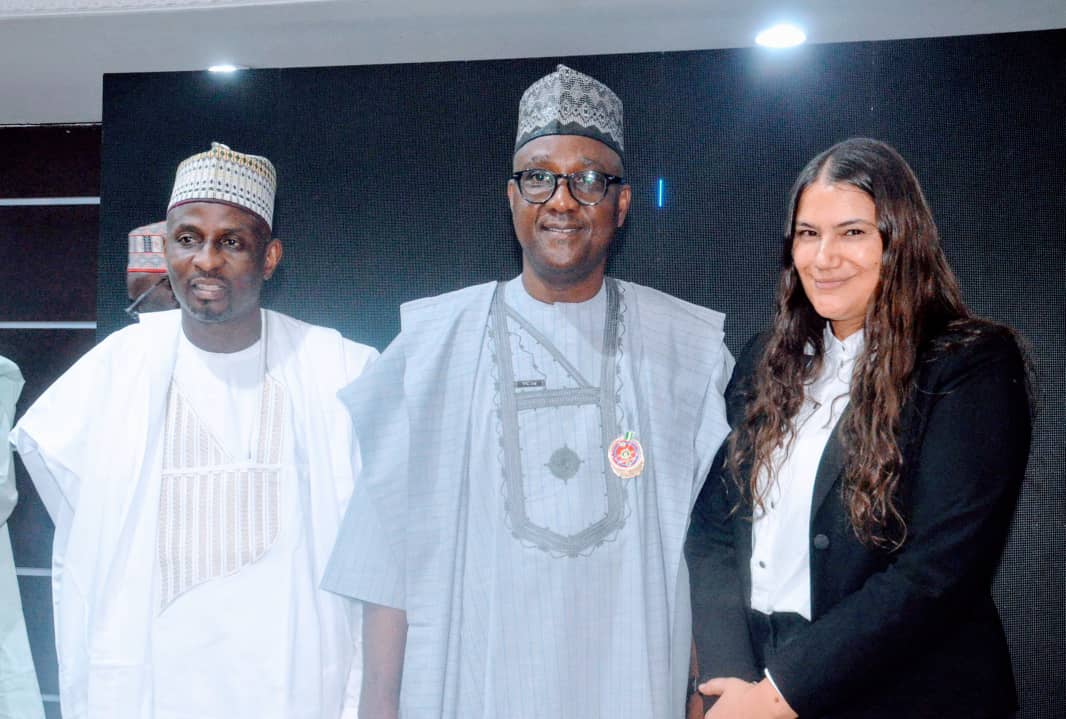News
Speaker Abbas Advocates Non-Kinetic Solutions to Nigeria’s Insecurity

By Gloria Ikibah
As Nigeria grapples with an rapidly increasing security crisis, the Speaker House of Representatives, Rep. Tajudeen Abbas, has called for a paradigm shift in how the nation addresses the root causes of violence.
Speaker Abbas who stated this at a high-level workshop held in Abuja, called for non-kinetic strategies alternatives to military force as essential tools for fostering long-term peace and stability.
Abbas emphasised that while military operations are necessary, they should not be Nigeria’s sole approach to combating insecurity.
Drawing lessons from countries like Rwanda and Kenya, where non-kinetic strategies have mitigated violence and fostered national reconciliation, he advocated for dialogue, economic empowerment, and community engagement as key elements of a sustainable security framework.
“Relying solely on force risks treating symptoms rather than addressing the underlying causes of insecurity,” Abbas said.
He pointed to programs such as ‘Operation Safe Corridor’, which rehabilitates and reintegrates former insurgents, as evidence that alternative approaches can yield positive results.
Speaker Abbas also highlighted the financial burden of Nigeria’s security challenges.
Over the past two decades, trillions of naira have been spent on military operations, with N3.25 trillion 12% of the 2024 national budget allocated to defence and security alone. While acknowledging the necessity of these expenditures, the Speaker argued for a more cost-effective approach: investing in education, healthcare, and infrastructure to address the socioeconomic conditions that fuel unrest.
“Education and economic development are as critical to security as weapons and military personnel,” Abbas stated.
According to Abbas, one non-kinetic measure that has already shown promise in Nigeria is community policing, enabled by the Police Act of 2020. He described it as a key strategy in bridging the gap between law enforcement and local communities. By building trust and empowering citizens, community policing helps foster safer neighborhoods where residents actively participate in securing their environment.
In a landmark announcement, Abbas unveiled the creation of a Standing Committee on Peacebuilding and Social Cohesion in the House of Representatives. Tasked with developing policies to promote peace and stability, the committee will be the first of its kind in Nigeria and possibly Africa.
He commended the United Nations Development Programme (UNDP) for supporting the initiative and pledged the commitment of the House to advancing sustainable security solutions.
The workshop, organized in collaboration with Konrad Adenauer Stiftung (KAS), brought together stakeholders from the security sector, intelligence agencies, and civil society.
Resident Representative of KAS, Marija Peran, extolled Speaker Abbas for his leadership and vision in hosting the event.
“It was Mr. Speaker himself who initiated this very important event, and KAS is proud to partner on this initiative,” Peran said.
She underscored the importance of addressing the root causes of insecurity, arguing that military solutions alone cannot resolve Nigeria’s complex security challenges.
Peran outlined several non-kinetic strategies, including economic development, education, and good governance, and emphasised that poverty and unemployment create fertile ground for extremist ideologies, making economic empowerment a crucial component of any long-term security plan.
“By creating jobs and supporting small businesses, especially for women and youth, we can provide alternatives to violence and reduce the appeal of terrorist groups,” she said.
Education, too, emerged as a critical tool in combating insecurity, Peran therefore called for increased access to quality education in conflict-prone areas, noting that an educated population is less likely to be swayed by extremist ideologies.
“This includes vocational training and civic education that promote tolerance and understanding,” she added.
Good governance and transparency were also identified as essential. According to Peran, corruption and mismanagement undermine efforts to address insecurity, eroding trust between the government and its citizens. She called for stronger institutions and adherence to the rule of law to build a foundation for sustainable peace.
Peran urged legislators to take an active role in advancing non-kinetic strategies. “The legislature has a crucial role to play in shaping policies, allocating resources, and holding the executive accountable,” she said.
As the workshop concluded, Abbas reaffirmed his commitment to seeking innovative solutions that not only address immediate security threats but also tackle their root causes.
“Our focus must be on building a Nigeria where peace and stability are the norm, not the exception,” he declared.
With the formation of the Peacebuilding and Social Cohesion Committee and the continued collaboration of key stakeholders, Nigeria may be on the brink of a new chapter in its fight against insecurity one where dialogue, development, and trust take center stage.
News
CBN announces revised documentation requirements for PAPSS transactions

The Central Bank of Nigeria (CBN) has announced a revised documentation requirement for transactions conducted through the Pan-African Payment and Settlement System (PAPSS) in Nigeria.
This was disclosed in a statement issued by the apex bank’s acting Director, Corporate Communications, Mrs. Hakama Sidi Ali
The CBN said the new initiative is part of its ongoing commitment to foster seamless intra-African trade, financial inclusion, and operational efficiency for Nigerians engaging in cross-border payments within Africa.
Launched by Afreximbank in partnership with the African Union and the African Continental Free Trade Area (AfCFTA) secretariat in January 2022, PAPSS serves as a centralized payment and settlement platform that enables instant, secure, and efficient cross-border transactions throughout Africa.
By facilitating payments in local currencies, PAPSS minimizes reliance on third-party currencies, reduces transaction costs, and supports the rapid expansion of trade under the AfCFTA.
In a recent circular referenced TED/FEM/PUB/FPC/001/006 issued on April 28, 2025, CBN outlined the key changes to the documentation requirements associated with PAPSS transactions.
The key changes it added take effect immediately and include simplified documentation for low-value transactions, which allows customers to now use basic KYC and AML documents provided to their authorized dealer banks for low-value transactions of up to $2,000 and $5,000 equivalent in naira for individuals and corporate bodies, respectively.
“For transactions above the thresholds, all documentation as stipulated in the CBN foreign exchange manual and related circulars remains mandatory,” the bank said.
Also, the CBN added that applicants are responsible for ensuring all regulatory documents are available to facilitate the clearance of goods, as required by relevant government agencies.
“Authorized dealer banks may now source foreign exchange for PAPSS settlements through the Nigerian foreign exchange market, without recourse to the CBN.
“All export proceeds repatriated via PAPSS shall be certified by the relevant processing banks.
“The Central Bank of Nigeria urges all banks to adopt PAPSS and commence originating transactions in line with this new policy.
“In addition, CBN encourages exporters, importers, and individuals to familiarize themselves with the new requirements and leverage PAPSS for cross-border transactions within Africa,” the statement said.
News
Reps Set Stage for Nigeria’s First Legislative Conference on Renewable Energy

By Gloria Ikibah
The House of Representatives is set to host the country’s first National Legislative Conference on Renewable Energy, aimed at driving new laws, attracting investment, and pushing Nigeria further along its energy transition journey.
This was revealed during a press briefing by the Chairman, House Committee on Renewable Energy, Rep. Afam Victor Ogene, who described the event as a turning point for energy legislation in Nigeria.
He said: “The conference aims at bringing together key stakeholders and industry players to discuss renewable energy legislations, energy transition, renewable energy financing, investment opportunities and related matters.
“It’s about developing a national legislative framework on renewable energy”.
The conference, which is being organised by the House Committee on Renewable Energy in partnership with the Office of the Speaker of the House of Representatives, and the United Nations Development Programme (UNDP), will take place under the UNDP Parliamentary Development Program.
Rep. Ogene noted that recent legal reforms have created space for state governments to play a more active role in Nigeria’s power sector. He pointed to the Fifth Alteration Bill 2022 (No.33), now signed into law, which allows states to legislate on electricity matters within the national grid. Before now, states could only act on off-grid power.
In addition, he highlighted the Electricity Act of 2023, which came into effect in February 2024.
“It permits states to issue licenses for all electricity activities – generation, transmission and distribution across the entire power sector value chain,” he said.
The Committee Chairman further stated that the new National Integrated Electricity Policy, expected in 2025, will guide states in forming new electricity markets, where solar power and other renewable sources will be key to reaching underserved communities.
Ogene explained, “The conference has three clear objectives:
“To promote dialogue among legislators, experts and stakeholders on critical legislative priorities.
“To establish a coordinated platform for federal and state lawmakers, and to produce a clear, time-bound legislative action plan.
“International partners are also on board. The Inter-Parliamentary Union (IPU) will participate, and parliaments from South Africa, Ghana and Gambia have confirmed attendance. Ghana is sending a three-man delegation led by the Deputy Speaker, Rt. Hon. Alban Kingsford Bagbin”.
In another major highlight, the Netherlands-based platform INCLUDE will host a Pan-African Legislative Dialogue session on renewable energy, to be chaired by the Hon. Speaker, Rt. Hon. Abbas Tajudeen.
“The session will focus on how to establish a unified legislative framework on renewable energy development, investment and financing.
“The time has come for us to act. This is not just another conference – it is the foundation of Nigeria’s renewable energy future”, Ogene added.
Expected outcomes from the conference include new policy and legislative reform proposals to boost renewable energy use, as well as draft laws that will encourage public and private sector investment.
Other goals are to enhance collaboration between federal and state lawmakers, raise public awareness, and roll out a practical roadmap for implementation and progress tracking.
The event will also feature a technology showcase of renewable energy innovations and business opportunities.
News
Alleged money laundering: EFCC produces Aisha Achimugu in court

By Francesca Hangeior
The operatives of the Economic and Financial Crimes Commission (EFCC), on Wednesday, arrived at the Federal High Court in Abuja with the businesswoman, Aisha Achimugu, as ordered by the court.
Achimugu, who was sandwiched by two female EFCC officers, arrived in court at about 11:35 am.
It could be recalled that Justice Inyang Ekwo had, on Monday, ordered the industrialist, alleged to have fled the country, to honour the invitation by the anti-graft agency on Tuesday at noon.
Justice Ekwo, who gave the order in a short ruling, also ordered the EFCC, upon the appearance of Achimugu at its office, to return with her to court on Wednesday for a report.
Achimugu was, however, said to have been arrested by the EFCC’s operatives on her arrival abroad at about 5 am and kept in custody.
-

 Metro10 hours ago
Metro10 hours agoGunmen storm University of Benin teaching hospital, kill doctor
-

 Politics22 hours ago
Politics22 hours agoJust in: Ex- Gov Okowa accepts betraying Southern Nigeria, laments running with Atiku
-

 Metro10 hours ago
Metro10 hours agoFCTA destroys 601 motorbikes over violations
-

 News10 hours ago
News10 hours agoJust in: FG declares tomorrow public holiday
-

 News22 hours ago
News22 hours agoBoko Haram Kill Mourners, Kidnap Others In Borno
-

 News2 hours ago
News2 hours agoAlleged money laundering: EFCC produces Aisha Achimugu in court
-

 News22 hours ago
News22 hours agoDeputy Speaker Leads Defection of PDP Stalwart Chris Igwe, 13,000 Followers to APC In Abia
-

 News3 hours ago
News3 hours agoJUST IN: Major General Paul Ufuoma Omu Rtd, dies at 84

















